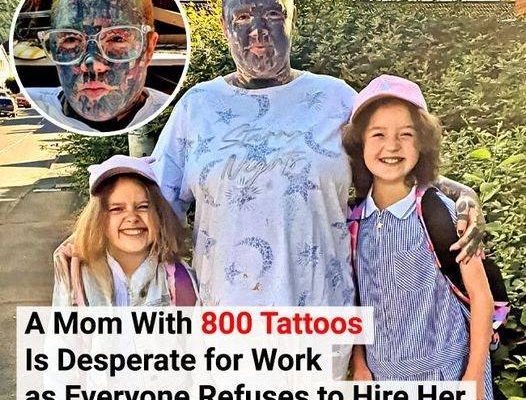elissa Sloan, a 46-year-old mother from Wales, has all too frequently had to balance the cost of her own expression against social conventions. Melissa, who has more than 800 tattoos on her body, including her face, has had a difficult time getting a job.
She received her first tattoo at the age of 20, marking the beginning of her tattoo adventure. What began as a straightforward way to express oneself swiftly developed into a strong passion.

Melissa’s body has become a canvas throughout the years, and her face is covered in a patchwork of elaborate designs. Although she is proud of her tattoos, they have also turned into a barrier.
Melissa remembers a turning point in her life when she was rejected from a cleaning position because of her tattoos. “They didn’t even look at my skills,” she claims. “It was all about how I looked.” She is by no means alone in her experience; rejection has been a recurring theme in her job search.

As the family’s main provider for her two kids, Melissa is determined to support them, but her tattoos have made finding steady employment all but impossible. “People judge before they know you,” she says. “They see my face and think I can’t do the job, but tattoos don’t define my abilities.”

Melissa is unrepentant about her tattoos, highlighting their significance in forming her personality but also admitting their extreme nature. She states, “They’re a part of who I am.” Even though she is aware of the possible health dangers, her dedication to inking is so strong that she intends to keep obtaining tattoos long into old age.

But there is a cost to this intense individualism. Her struggle serves as a sobering reminder of the prejudices present in both society and the workplace. Melissa’s tale demonstrates the persistent stigma associated with substantial body art, especially in professional contexts, despite the fact that tattoos are becoming more and more accepted in many countries.

Melissa’s story raises more general concerns about how society views individuals. Are employment decisions based solely on appearance justified by employers? Does this, instead, reinforce unjust stereotypes? The problem is obvious to Melissa: “Your work should speak for itself, not your looks.”

Online discussions around inclusivity and the restrictions imposed on people who don’t fit the mold of conventional beauty have been triggered by her narrative. While some contend that Melissa’s tattoos are a personal decision with known repercussions, others see her difficulties as evidence of society’s inability to accept diversity.
Melissa is still navigating the difficulties her tattoos create for the time being, hoping to find employment that recognizes her abilities rather than her looks. Her narrative reflects the broader discussion about acceptance, prejudice, and individuality in the modern world.
Will social biases keep Melissa and those like her on the periphery, or will workplaces change to accommodate them? One thing is certain: Melissa Sloan is not going to back down. Only time will tell.

As she puts it: “I am who I am. And I won’t say I’m sorry for that.”



